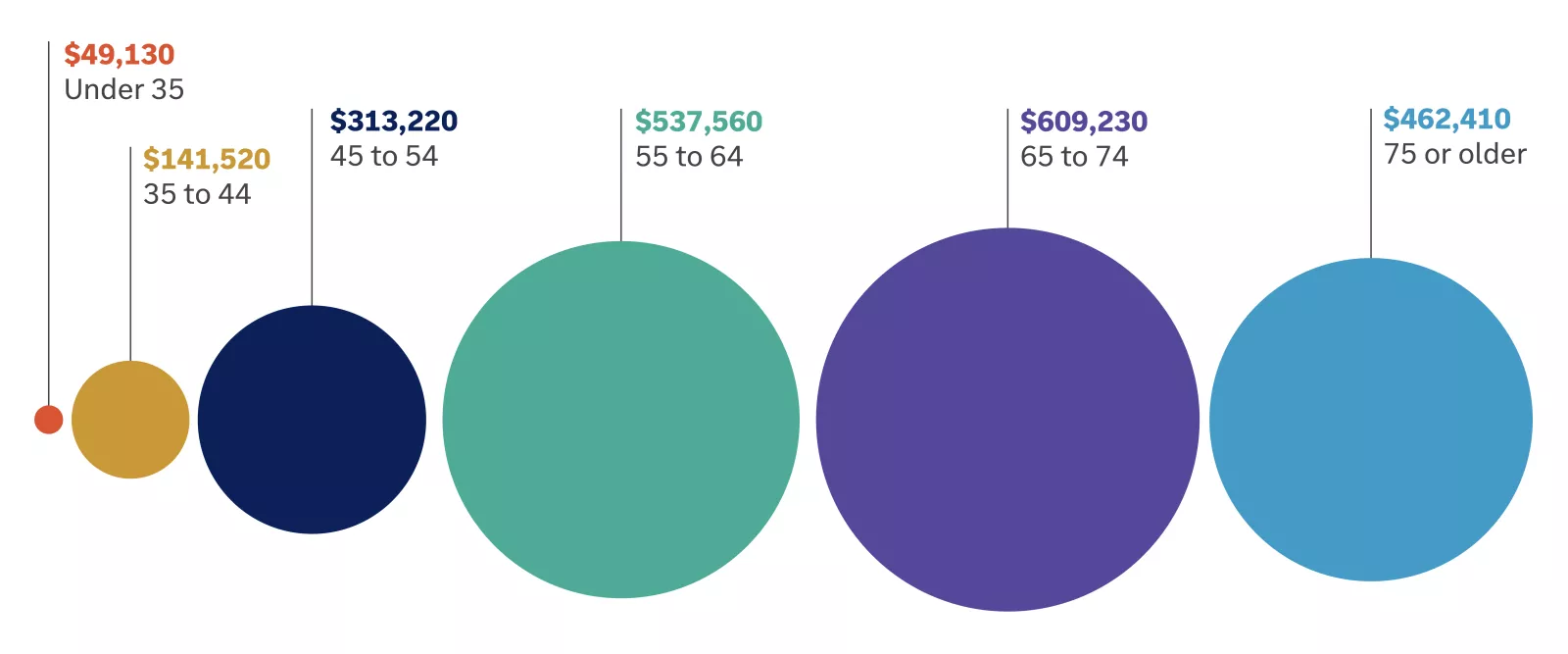| Age | $50,000 salary | $100,000 salary | $150,000 salary | $200,000 salary |
|---|---|---|---|---|
| 20 | $0 - $0 | $0 - $0 | $0 - $5,000 | $0 - $100,000 |
| 21 | $0 - $0 | $0 - $0 | $0 - $25,000 | $0 - $135,000 |
| 22 | $0 - $0 | $0 - $0 | $0 - $50,000 | $0 - $170,000 |
| 23 | $0 - $0 | $0 - $0 | $0 - $75,000 | $0 - $205,000 |
| 24 | $0 - $5,000 | $0 - $5,000 | $20,000 - $100,000 | $120,000 - $245,000 |
| 25 | $0 - $10,000 | $0 - $20,000 | $40,000 - $125,000 | $155,000 - $280,000 |
| 26 | $0 - $20,000 | $0 - $35,000 | $65,000 - $155,000 | $190,000 - $320,000 |
| 27 | $0 - $25,000 | $0 - $55,000 | $90,000 - $180,000 | $225,000 - $360,000 |
| 28 | $10,000 - $35,000 | $20,000 - $70,000 | $115,000 - $210,000 | $265,000 - $400,000 |
| 29 | $15,000 - $45,000 | $35,000 - $90,000 | $145,000 - $240,000 | $305,000 - $445,000 |
| Age | $50,000 salary | $100,000 salary | $150,000 salary | $200,000 salary |
|---|---|---|---|---|
| 30 | $25,000 - $55,000 | $50,000 - $105,000 | $170,000 - $270,000 | $345,000 - $490,000 |
| 31 | $35,000 - $60,000 | $65,000 - $125,000 | $200,000 - $300,000 | $385,000 - $535,000 |
| 32 | $40,000 - $70,000 | $85,000 - $145,000 | $230,000 - $330,000 | $425,000 - $580,000 |
| 33 | $50,000 - $80,000 | $100,000 - $165,000 | $260,000 - $365,000 | $470,000 - $630,000 |
| 34 | $60,000 - $90,000 | $120,000 - $185,000 | $290,000 - $395,000 | $515,000 - $675,000 |
| 35 | $70,000 - $100,000 | $140,000 - $205,000 | $320,000 - $430,000 | $560,000 - $730,000 |
| 36 | $80,000 - $115,000 | $160,000 - $225,000 | $355,000 - $470,000 | $605,000 - $780,000 |
| 37 | $90,000 - $125,000 | $180,000 - $245,000 | $385,000 - $505,000 | $655,000 - $835,000 |
| 38 | $100,000 - $135,000 | $200,000 - $270,000 | $420,000 - $540,000 | $705,000 - $890,000 |
| 39 | $110,000 - $145,000 | $220,000 - $295,000 | $455,000 - $580,000 | $755,000 - $945,000 |
| Age | $50,000 salary | $100,000 salary | $150,000 salary | $200,000 salary |
|---|---|---|---|---|
| 40 | $120,000 - $160,000 | $245,000 - $315,000 | $490,000 - $620,000 | $810,000 - $1,005,000 |
| 41 | $135,000 - $170,000 | $265,000 - $340,000 | $530,000 - $665,000 | $865,000 - $1,065,000 |
| 42 | $145,000 - $185,000 | $290,000 - $365,000 | $570,000 - $705,000 | $920,000 - $1,125,000 |
| 43 | $155,000 - $195,000 | $315,000 - $395,000 | $610,000 - $750,000 | $980,000 - $1,190,000 |
| 44 | $170,000 - $210,000 | $335,000 - $420,000 | $650,000 - $795,000 | $1,035,000 - $1,255,000 |
| 45 | $180,000 - $225,000 | $360,000 - $450,000 | $690,000 - $840,000 | $1,100,000 - $1,325,000 |
| 46 | $195,000 - $240,000 | $390,000 - $475,000 | $735,000 - $890,000 | $1,160,000 - $1,390,000 |
| 47 | $210,000 - $255,000 | $415,000 - $505,000 | $780,000 - $935,000 | $1,225,000 - $1,465,000 |
| 48 | $220,000 - $270,000 | $445,000 - $535,000 | $825,000 - $985,000 | $1,290,000 - $1,535,000 |
| 49 | $235,000 - $285,000 | $470,000 - $565,000 | $870,000 - $1,040,000 | $1,360,000 - $1,615,000 |
| Age | $50,000 salary | $100,000 salary | $150,000 salary | $200,000 salary |
|---|---|---|---|---|
| 50 | $250,000 - $300,000 | $500,000 - $600,000 | $920,000 - $1,090,000 | $1,430,000 - $1,690,000 |
| 51 | $265,000 - $315,000 | $530,000 - $630,000 | $970,000 - $1,145,000 | $1,505,000 - $1,770,000 |
| 52 | $280,000 - $335,000 | $560,000 - $665,000 | $1,020,000 - $1,205,000 | $1,580,000 - $1,855,000 |
| 53 | $295,000 - $350,000 | $595,000 - $700,000 | $1,075,000 - $1,260,000 | $1,655,000 - $1,940,000 |
| 54 | $315,000 - $370,000 | $625,000 - $735,000 | $1,130,000 - $1,320,000 | $1,735,000 - $2,025,000 |
| 55 | $330,000 - $385,000 | $660,000 - $775,000 | $1,185,000 - $1,385,000 | $1,815,000 - $2,115,000 |
| 56 | $345,000 - $405,000 | $695,000 - $810,000 | $1,245,000 - $1,445,000 | $1,900,000 - $2,205,000 |
| 57 | $365,000 - $425,000 | $730,000 - $850,000 | $1,300,000 - $1,515,000 | $1,985,000 - $2,305,000 |
| 58 | $385,000 - $445,000 | $765,000 - $890,000 | $1,365,000 - $1,580,000 | $2,075,000 - $2,400,000 |
| 59 | $400,000 - $465,000 | $805,000 - $930,000 | $1,425,000 - $1,650,000 | $2,165,000 - $2,500,000 |
| Age | $50,000 salary | $100,000 salary | $150,000 salary | $200,000 salary |
|---|---|---|---|---|
| 60 | $420,000 - $485,000 | $845,000 - $975,000 | $1,490,000 - $1,720,000 | $2,260,000 - $2,605,000 |
| 61 | $440,000 - $510,000 | $885,000 - $1,020,000 | $1,555,000 - $1,795,000 | $2,355,000 - $2,710,000 |
| 62 | $460,000 - $530,000 | $925,000 - $1,065,000 | $1,625,000 - $1,870,000 | $2,455,000 - $2,820,000 |
| 63 | $485,000 - $555,000 | $965,000 - $1,110,000 | $1,695,000 - $1,945,000 | $2,560,000 - $2,935,000 |
| 64 | $505,000 - $580,000 | $1,010,000 - $1,155,000 | $1,770,000 - $2,025,000 | $2,665,000 - $3,050,000 |
| 65 | $525,000 - $605,000 | $1,055,000 - $1,205,000 | $1,845,000 - $2,110,000 | $2,770,000 - $3,170,000 |

